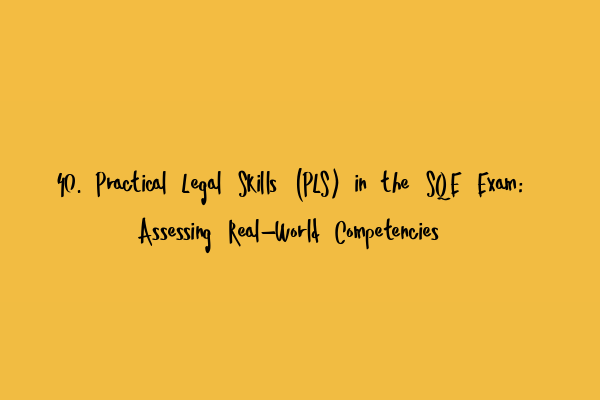40. Practical Legal Skills (PLS) in the SQE Exam: Assessing Real-World Competencies
Welcome to our comprehensive guide on the practical legal skills (PLS) section of the SQE exam. As a future solicitor, it is essential to develop not only theoretical knowledge but also the practical skills required to excel in real-world legal practice. The PLS assessment in the SQE exam focuses on evaluating candidates’ abilities to apply their legal knowledge to practical scenarios effectively. In this article, we will delve into the details of the PLS assessment, its significance, and how you can prepare for this crucial part of the exam.
Understanding the practical legal skills assessment in the SQE exam
The PLS assessment in the SQE exam aims to evaluate candidates’ practical legal skills and their ability to apply legal principles to different given scenarios. This section of the exam is designed to replicate real-world legal practice, where solicitors are often required to analyze complex situations and apply their legal knowledge to provide effective legal advice.
During the PLS assessment, candidates will be presented with a range of fictionalized scenarios that simulate real-life legal issues. These scenarios may include client meetings, legal drafting, legal research, negotiation exercises, and advocacy tasks. Candidates are required to demonstrate their ability to identify the relevant legal issues, apply legal principles, analyze the facts, and provide appropriate advice or solutions.
The significance of practical legal skills in the SQE exam
The inclusion of the PLS assessment in the SQE exam highlights the importance of practical legal skills in the legal profession. As a solicitor, you will be expected to handle various legal tasks and provide practical solutions to your clients’ legal issues. The PLS assessment ensures that candidates possess the necessary skills to handle these responsibilities effectively.
Moreover, the assessment also evaluates candidates’ ability to communicate in a professional and client-focused manner. Effective communication is a crucial skill for solicitors, as you will need to convey complex legal concepts to clients who may have little or no legal knowledge.
Preparing for the PLS assessment in the SQE exam
Preparing for the PLS assessment requires a combination of theoretical knowledge and practical application. Here are some tips to help you prepare effectively:
- 1. Develop a strong foundation of legal knowledge: The PLS assessment will require you to apply legal principles to different scenarios. Therefore, it is essential to develop a strong foundation of legal knowledge in areas such as contract law, criminal law, tort law, and other subjects tested in the SQE exam. Enrolling in SQE preparation courses can be highly beneficial in acquiring the necessary knowledge and understanding.
- 2. Familiarize yourself with legal drafting and research: Legal drafting and research skills are critical for a successful PLS assessment. Practice drafting various legal documents, such as contracts, legal opinions, and client advice letters. Additionally, hone your legal research skills to efficiently find relevant case law, legislation, and legal commentary.
- 3. Engage in mock scenarios and simulations: Practicing under exam conditions is crucial to build confidence and familiarity with the PLS assessment format. Participate in mock exams and simulations that mimic the scenarios you are likely to encounter in the actual exam. This will help you refine your practical legal skills and identify areas for improvement.
- 4. Seek feedback and guidance: Engage with experienced solicitors, mentors, or legal professionals who can provide valuable feedback on your performance. Their insights will help you identify any areas that require further development and enhance your understanding of real-world legal practice.
In conclusion, the PLS assessment in the SQE exam is a vital component that evaluates candidates’ practical legal skills and their ability to apply legal knowledge to real-world scenarios. To excel in this section, a combination of theoretical knowledge, practical application, and effective communication is required. By preparing strategically and seeking guidance from experienced professionals, you can enhance your practical legal skills and increase your chances of success in the SQE exam.
For more information and resources to help you prepare for the SQE exam, check out these related articles:
